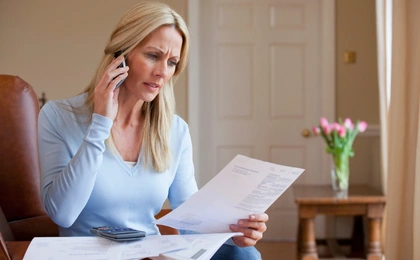Debt can creep up on anyone. It’s important to recognise the early warning signs so you can take action before things get out of hand. Here are some key things to watch out for.
Relying on credit
Using credit for everyday expenses can be a red flag, for example if you:
- regularly use credit cards or overdrafts for essentials, like food shopping
- take out loans to cover basic living costs
Unsure how much you owe
If you’re not quite sure how much you owe, it might be time for a financial health check. You may have lost track for a few reasons, such as:
- an unexpected financial emergency
- no structured repayment plan
- higher interest rates than you thought
Struggling to pay bills
You might be in financial difficulty if you find yourself:
- paying bills late
- only making minimum payments on credit cards
- borrowing more money to pay off other debts
Making the minimum payment can help to protect your credit score and avoid late fees. But it’s better to pay more if you can, to cut the amount of interest you pay overall.
Getting calls from creditors
If creditors are often calling you to chase up payment, it’s a sign that your debts are becoming unmanageable.
We recommend that you talk to your creditors as soon as possible to see if there’s anything they can do to help. Or you could ask a debt adviser to contact them for you.
Feeling stressed about money
Debt can take a toll on your mental health and may cause you to constantly worry, lose sleep, and feel anxious or depressed about your finances.
Mental health can also affect the way people deal with money. For example, if you feel low, tackling your finances might feel like too big a task, and you might avoid opening bills.
If you feel like this, there is support available. You could:
- talk to someone you trust
- speak to a health professional, like your doctor
- get peer support from someone in a similar situation
- contact the Samaritans (they’re available 24 hours a day, 365 days a year)
Read on for 5 ways to reduce financial stress.
Avoiding financial discussions
Talking about money with your partner or someone close can be difficult. It can also be a sign that you’re feeling overwhelmed by debt.
Read our blog on how to tell your partner about debt if you want to open a conversation but don’t know where to start.
What to do next
If you recognise any of these warning signs, don’t panic. There are steps you can take to get back on track.
1. Create a budget
Creating a budget will help you to track your income and expenses to see where your money is going. It can also help you to find things that you could cut down on, like subscription services that you don’t use, for example.
2. Speak with your creditors
Your creditors might be able to help if you explain your situation. For example, they could put a reduced payment plan in place, which could help to keep your finances under control.
Bear in mind that paying less than the minimum per month towards your debt can affect your credit score, but it is much better than stopping payments altogether.
3. Check if you’re eligible for ‘breathing space’
Breathing space is a government-backed scheme that stops creditors from enforcing the debt or adding interest or charges for up to 60 days.
4. Consider getting free debt advice
If you're struggling with debt, you can get free, impartial advice from Money Wellness, Citizens Advice, National Debtline, MoneyHelper, or StepChange.
They will be able to help create your budget, see if you qualify for benefits, look at different debt solutions for you, and speak to your creditors on your behalf.
Remember, recognising the warning signs is the first step towards taking control of your finances. You’re not alone, and help is available. Taking action now can prevent bigger problems down the road.
Read on for more tips on how to get help with debt. And find out what is better – debt management or debt consolidation?
Adele is a personal finance writer with more than 10 years in the finance industry behind her. She writes clear and engaging guides on all things loans for Ocean, as well as contributing blogs to help people understand their options when it comes to money.










